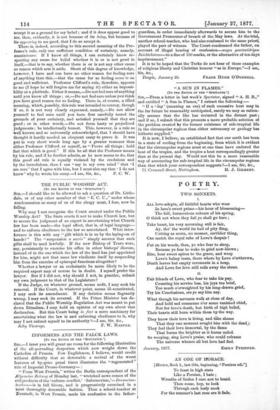THE PUBLIC WORSHIP ACT.
[TO THE EDITOR OF THIS " SPECTATOR.1
&u,—I should like to be allowed to ask a question of Dr. Little- dale, or of any other member of that "E. C. U.," under whose condemnation so many of us of the clergy must, I fear, now be falling.
Why may I not recognise the Court erected under the Public Worship Act? The State erects it not to make Church law, but to secure the judgment of an expert in ascertaining what Church law has been made—the legal effect, that is, of legal language— and to enforce obedience to the law so ascertained. What inter- ference is this with any "gift which is in us by the laying-on of hands?" The "suspension a sacris" simply secures that such gifts shall be used lawfully. If the new Bishop of Truro were, say, persistently to exercise his office in other bishops' diocese, instead of in the one which the law of the land has just appointed for him, might not that same law vindicate itself by suspending him from the exercise of episcopal functions altogether?
Whether a lawyer or an ecclesiastic be more likely to be the required expert may of course be in doubt. I myself prefer the lawyer. But if I did not, why should I not, in practice, submit my own judgment to that of the Legislature?
If the Judge, on whatever ground, seems unfit, I may seek his removal. If the Court, in whatever point, seems ill-constituted, I may seek its amendment. If any decision seems flagrantly wrong, I may seek its reversal If the Prime Minister has de- clared that the Public Worship Regulation Act was meant to put down Ritualism, I may hold an opinion of my own about that declaration. But this Court being in fact a mere machinery for ascertaining what the law is and enforcing obedience to it, why may I not submit myself to its authority ?—I am, Sir, &c.,


































 Previous page
Previous page